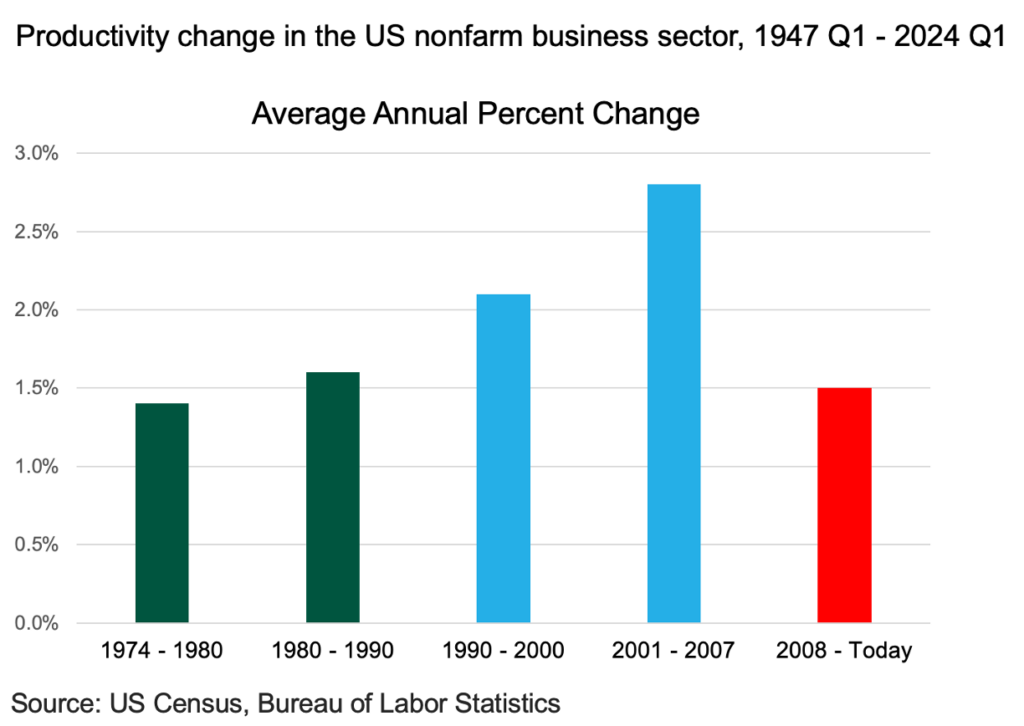AI Computing Will Change The World By Empowering People, Not Automating Tasks
Most of the hype and boardroom enthusiasm for generative AI (genAI) stems from the belief that AI machines will automate the repeatable tasks that people used to do, thereby saving firms money with fewer employees doing more work. While we believe that’s true for rote knowledge tasks and some knowledge worker roles, it’s not really the point.
The point is that automating work hasn’t ever changed the world by itself. If it had, the last 15 years of cloud computing and robotic process automation would have yielded higher business productivity. And it hasn’t. Instead, growth has been a tepid 1.5% in the non-farm sector of the US since the Great Recession.
Contrast that with the previous era, when PCs and the internet empowered people with access to information and services. Anybody with online access and an ability to master rules-based interfaces was empowered with near-infinite access to information and services. As the US Census data shows, in the client/server computing and internet computing eras, annual business productivity in the US increased at levels ultimately approaching 3% (see figure below).
In our new report, Change The Interface; Change The World, Brian Hopkins, James McQuivey, Julie Mohr, and I look beyond the current genAI bubble and rising disappointment to analyze the foundations of the real changes coming.
Business Productivity Data Shows The Impact Of Empowered People On Economic Growth

AI Computing Will Define A New Era Of Empowerment And Disruption
Business productivity will accelerate again as what we call AI computing triggers a new era of empowerment and disruption. AI interfaces and agents will give 8 billion people the ability to state their intensions and interact with AI machines that empower them with intuitive interfaces and powerful agents to better live, learn, work, shop, and receive services.
Economic and business growth will accelerate as people offload mundane tasks to AI machines and free their minds and time to focus on more important and interesting things. It will rise because companies will use AI computing to streamline workflows and reinvent creative and production processes, and it will rise because companies will take advantage of AI’s intention-based interfaces to deliver radically better products and services.
AI Computing Will Empower Companies To Reinvent Their “Knowledge Economies”
Over the next 15 to 20 years, AI-advantaged companies will reinvent how they put their knowledge and expertise to work. Using “AI knowledge loops,” they will capture, harvest, and put all their knowledge and expertise to work in a virtuous cycle of improvement. AI-advantaged companies will:
- Capture and harness all their tacit knowledge and expertise. Firms sit on disconnected data and vast troves of employee expertise, failing to fully capture, link, and deploy it. AI computing will change this. Leaders will capture and distill all their expertise — business, functional, domain, process, medical, mathematical, biological, behavioral, and more — into enterprise knowledge graphs. These specialized databases and search tools will become business-defining assets that furnish data for proprietary AI models.
- Put AI models to work through software. A firm’s knowledge capacity (the ability to expand what an enterprise knows and put it to work through technology) will become foundational to its competitive advantage. AI interfaces and agents will accelerate technology value by injecting expertise on demand into reconstructed workflows. These won’t be today’s chatbots and business rules; they will be engines of empowerment, personalized by roles, leading to the radical reinvention of day-to-day activities and business processes.
- Drive new sources of revenue with AI-powered products and experiences. Firms will ramp up these AI-powered growth engines in four ways: 1) hyper-personalization and targeted insights in product design and customer experience; 2) AI-enhanced products and services; 3) new managed service-as-software platforms built on a firm’s proprietary knowledge capacity; and 4) AI-native business models. AI computing is already reinventing marketing through brand AI models and new AI-native platform companies.
To take advantage of the full power of artificial intelligence, move beyond any early disappointment in magic tools and engage in the hard work of capturing knowledge, deploying applications for employees, creating new customer services, and building AI interfaces and agents that empower employees and customers to do more.
